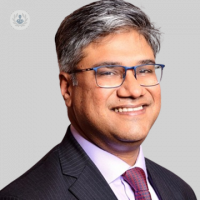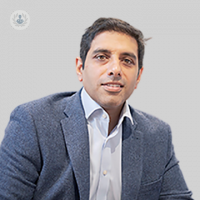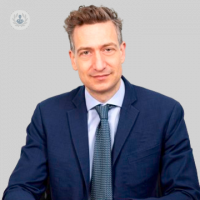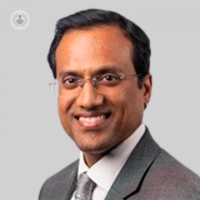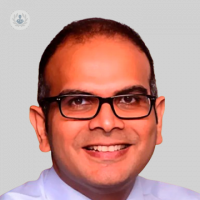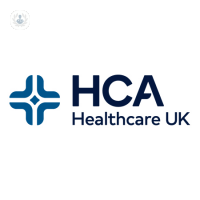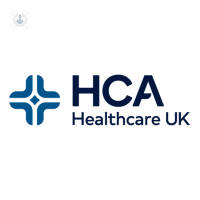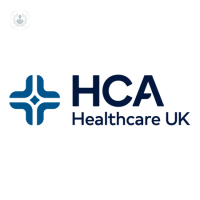What is cholangiocarcinoma?
Cholangiocarcinoma or bile duct cancer is a cancer consisting of mutated epithelial cells originating in one of the ducts that carry bile from the liver to the small intestine. The tumours are usually slow-growing and do not metastasise quickly. However, the majority are well advanced when detected.
Cholangiocarcinoma affects people of both sexes and most patients are more than 65 years of age. It is, however, a rare disease that only occurs in 2 out of every 100,000 people.

What are the symptoms of cholangiocarcinoma?
Cholangiocarcinoma obstructs the bile ducts, and may involve any of these symptoms:
- jaundice (yellow coloration of the skin)
- pale stools/dark urine
- abdominal pain and possibly, swelling in the upper right-hand side that may also affect the back
- itching
- loss of appetite
- weight loss
- fever, chills
- severe loss of libido
Causes of cholangiocarcinoma
Cholangiocarcinoma can appear anywhere in the bile ducts and it is a rare type of tumour. The main risk factors for this disease are:
- Abnormalities of the bile ducts, e.g cysts
- Liver and bile duct inflammation
- Biliary stones – similar to gallstones, these hard objects form in the liver and bile ducts
- Infection with hepatic fluke parasites (common in Asia)
- Primary sclerosing cholangitis – an inflammatory disease that causes long-term scarring of the bile ducts
- Exposure to toxins or chemicals
Can it be prevented?
Cholangiocarcinoma is usually detected when it is already in an advanced state, and that some of its symptoms such as fever or abdominal pain can be confused with other diseases.
Currently, there is no known way to prevent it. Therefore, early diagnosis is essential for a good prognosis. To diagnose cholangiocarcinoma, the oncologist will perform tests, such as abdominal computerised tomography (CT) and abdominal ultrasound.
What is the treatment for cholangiocarcinoma?
In many cases, cholangiocarcinoma is not curable, as it is usually only diagnosed at an advanced stage after it has grown and spread. However, even at that stage, treatment can help control the symptoms for months or even years.
Treatments for cholangiocarcinoma include:
- Inserting a stent (a hollow tube) into the bile duct to keep it open and prevent it becoming blocked, relieving certain symptoms, e.g. jaundice.
- Chemotherapy
- Radiotherapy
- Surgery – only suitable for certain patients, but by surgically removing the affected area, the cancer could be cured entirely if it hasn’t spread to other parts of the body.
Cholangiocarcinoma (bile duct cancer)
What is cholangiocarcinoma?
Cholangiocarcinoma or bile duct cancer is a cancer consisting of mutated epithelial cells originating in one of the ducts that carry bile from the liver to the small intestine. The tumours are usually slow-growing and do not metastasise quickly. However, the majority are well advanced when detected.
Cholangiocarcinoma affects people of both sexes and most patients are more than 65 years of age. It is, however, a rare disease that only occurs in 2 out of every 100,000 people.

What are the symptoms of cholangiocarcinoma?
Cholangiocarcinoma obstructs the bile ducts, and may involve any of these symptoms:
- jaundice (yellow coloration of the skin)
- pale stools/dark urine
- abdominal pain and possibly, swelling in the upper right-hand side that may also affect the back
- itching
- loss of appetite
- weight loss
- fever, chills
- severe loss of libido
Causes of cholangiocarcinoma
Cholangiocarcinoma can appear anywhere in the bile ducts and it is a rare type of tumour. The main risk factors for this disease are:
- Abnormalities of the bile ducts, e.g cysts
- Liver and bile duct inflammation
- Biliary stones – similar to gallstones, these hard objects form in the liver and bile ducts
- Infection with hepatic fluke parasites (common in Asia)
- Primary sclerosing cholangitis – an inflammatory disease that causes long-term scarring of the bile ducts
- Exposure to toxins or chemicals
Can it be prevented?
Cholangiocarcinoma is usually detected when it is already in an advanced state, and that some of its symptoms such as fever or abdominal pain can be confused with other diseases.
Currently, there is no known way to prevent it. Therefore, early diagnosis is essential for a good prognosis. To diagnose cholangiocarcinoma, the oncologist will perform tests, such as abdominal computerised tomography (CT) and abdominal ultrasound.
What is the treatment for cholangiocarcinoma?
In many cases, cholangiocarcinoma is not curable, as it is usually only diagnosed at an advanced stage after it has grown and spread. However, even at that stage, treatment can help control the symptoms for months or even years.
Treatments for cholangiocarcinoma include:
- Inserting a stent (a hollow tube) into the bile duct to keep it open and prevent it becoming blocked, relieving certain symptoms, e.g. jaundice.
- Chemotherapy
- Radiotherapy
- Surgery – only suitable for certain patients, but by surgically removing the affected area, the cancer could be cured entirely if it hasn’t spread to other parts of the body.


The patient pathway in Biliary Tract Cancer
By Dr Shivan Sivakumar
2024-12-09
Biliary tract cancer, which includes cancers of the bile ducts (cholangiocarcinoma) and gallbladder, is a rare but aggressive type of cancer. The patient pathway from diagnosis to treatment involves multiple stages, each requiring specialised care and a multidisciplinary approach. In this informative article, leading senior medical oncologist Dr Shivan Sivakumar details why understanding this pathway can help patients and their families navigate the complexities of the disease and make informed decisions about their care. See more


What is cholangiocarcinoma, and where is it found in the body?
By Professor Brian Davidson
2024-11-11
This article contains information regarding cholangiocarcinoma, or in other terms, bile duct cancer. The medical expert to explain more about this cancer in detail here is distinguished consultant surgeon, Professor Brian Davidson. See more
Experts in Cholangiocarcinoma (bile duct cancer)
-
Dr Shivan Sivakumar
Medical oncologyExpert in:
- Pancreatic cancer
- Liver cancer
- Cholangiocarcinoma (bile duct cancer)
- Clinical trials
- Chemotherapy
- Immunotherapy
-
Mr Ricky Bhogal
SurgeryExpert in:
- Cholangiocarcinoma (bile duct cancer)
- Gallbladder surgery
- Liver cancer
- Neuroendocrine tumours
- Pancreas surgery
- Pancreatic cyst
-
Dr Nikolaos Diamantis
Medical oncologyExpert in:
- Colorectal cancer
- Oesophageal cancer
- Liver cancer
- Pancreatic cancer
- Cholangiocarcinoma (bile duct cancer)
- Rectal cancer
-
Mr Ravi Marudanayagam
SurgeryExpert in:
- Liver cancer
- Pancreatic cancer
- Gallbladder surgery
- Cholangiocarcinoma (bile duct cancer)
- Pancreatitis
- Spleen
-
Mr Bobby Dasari
SurgeryExpert in:
- Liver transplant
- Gallbladder surgery
- Gallstones
- Hernia
- Cholangiocarcinoma (bile duct cancer)
- Liver cancer
- See all

The Wellington Hospital - part of HCA Healthcare
The Wellington Hospital - part of HCA Healthcare
Wellington Hospital South Bldg, 8A Wellington Pl, NW8 9LE
No existe teléfono en el centro.
By using the telephone number provided by TOP DOCTORS, you automatically agree to let us use your phone number for statistical and commercial purposes. For further information, read our Privacy Policy
Top Doctors

The Harborne Hospital - part of HCA Healthcare
The Harborne Hospital - part of HCA Healthcare
Mindelsohn Way, B15 2FQ
No existe teléfono en el centro.
By using the telephone number provided by TOP DOCTORS, you automatically agree to let us use your phone number for statistical and commercial purposes. For further information, read our Privacy Policy
Top Doctors

The Harley Street Clinic - part of HCA Healthcare
The Harley Street Clinic - part of HCA Healthcare
35 Weymouth Street, London. W1G 8BJ
No existe teléfono en el centro.
By using the telephone number provided by TOP DOCTORS, you automatically agree to let us use your phone number for statistical and commercial purposes. For further information, read our Privacy Policy
Top Doctors
-
The Wellington Hospital - part of HCA Healthcare
Wellington Hospital South Bldg, 8A Wellington Pl, NW8 9LE, Central LondonExpert in:
- Digestive
- Cardiology
- Orthopaedic surgery
- Orthopaedic spinal surgery
- Intensive care
- Spine
-
The Harborne Hospital - part of HCA Healthcare
Mindelsohn Way, B15 2FQ, BirminghamExpert in:
- Digestive
- Cancer
- Orthopaedic surgery
- Thoracic Surgery
- Diagnostic Imaging
- Obstetrics and Gynaecology
-
The Harley Street Clinic - part of HCA Healthcare
35 Weymouth Street, London. W1G 8BJ, Central LondonExpert in:
- Cancer
- Head and neck cancer
- Cardiology
- Intensive care
- Diagnostic Imaging
- Women’s health
- See all
- Most viewed diseases, medical tests, and treatments
- CAR-T cells
- Hormone therapy
- Hodgkin's lymphoma
- Weight loss injections
- Genetic testing
- Nipple discharge
- Abdominal pain
- Endovenous laser treatment (EVLA)
- Minimal access surgery (keyhole surgery)
- Head and neck cancer
